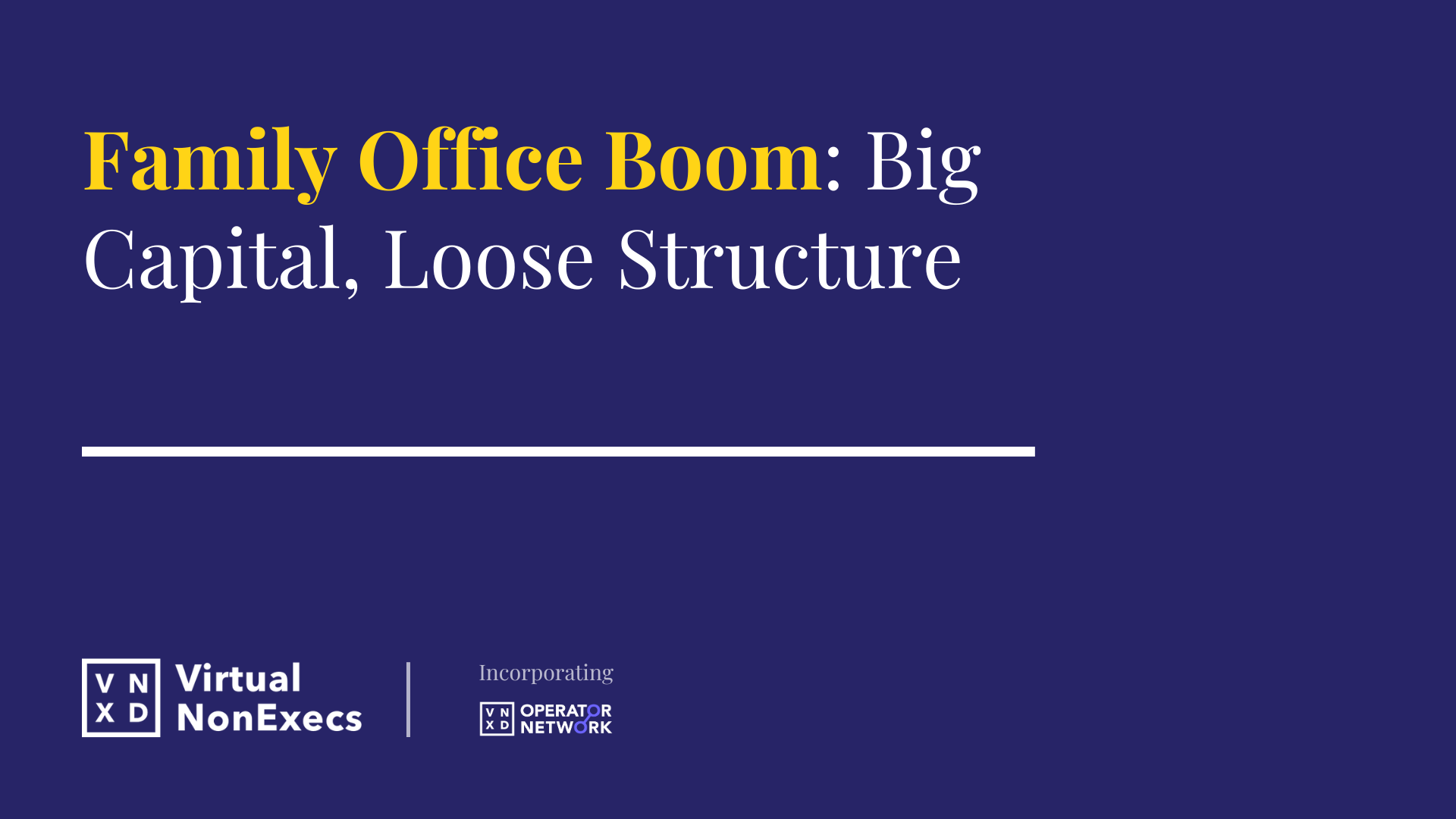Over the past decade, family offices have multiplied rapidly. Once reserved for ultra-wealthy dynasties managing generational wealth, the concept has evolved – and expanded – thanks to successful entrepreneurs, tech founders, and industry veterans who’ve exited businesses and chosen to “go direct” with their capital.
It’s estimated that there are now over 10,000 single-family offices globally, with new ones forming each week. Yet despite their growing influence, family offices remain fundamentally different from traditional institutional investors like private equity (PE) or venture capital (VC) funds. They’re often unstructured, operate below the radar, and vary dramatically in how they source, evaluate, and support investments.
What makes them attractive is their flexibility. Family offices often deploy patient capital, unconstrained by the fixed timelines, internal rate of return expectations, and institutional pressure that govern traditional funds. Many are willing to back businesses based on personal conviction, relationships, or alignment with family values. For founders, this can be a welcome alternative – less interference, more autonomy, and often a longer runway to scale.
But this flexibility comes at a cost. Many family offices lack formal investment processes or internal teams to support and manage their portfolio. Some have no dedicated investment professionals at all, relying instead on personal networks, external advisors, or even assistants to screen and triage deal flow. Others operate in isolation, investing only once or twice a year, making them hard to engage with consistently.
This lack of uniformity means that no two family offices are alike. Some behave like professional investment vehicles, with clear mandates and experienced operators, while others are little more than a principal making instinct-driven decisions. For founders and deal intermediaries, this creates friction. It’s difficult to know how to pitch, who to talk to, or whether interest today will translate into action tomorrow.
This is where Non-Executive Directors can play a critical role. In many cases, family offices don’t have the bandwidth to actively support portfolio companies post-investment. A well-placed NED brings not only governance and oversight but also commercial acumen, strategic thinking, and access to networks that can be transformative for a growing business. A NED can act as a bridge between the family office and the management team, a sounding board for founders, and a source of independent guidance when critical decisions arise. In the absence of a formal operating partner model, NEDs offer the professionalism that helps portfolio companies grow responsibly and sustainably.
Zain Jaffer, founder of Zain Ventures, highlights the long-term lens that many family offices take. “My long-term vision… is to build a portfolio that doesn’t just survive market cycles but thrives through them,” he explains. “We’re thoughtful in how we manage our assets and risks too.” This desire for thoughtful, value-aligned investing is at the core of many family offices’ strategies, but without structure and discipline, good intentions can fall short.
Brad Briner, a long-time allocator and family office insider, adds that “availability and candor are the two most essential characteristics for people who approve investments.” In a world where trust and relationship often matter more than pitch decks and cap tables, those softer dynamics become central. But candor without process can be risky – and that’s where professional oversight and advisory input become essential.
A multi-generational family office executive summed it up well in a Charles Skorina & Co interview: “Perhaps the most valuable things we bring… are rigor, discipline and accountability… no one professional has sole authority… one plays the skeptic.” That statement hints at a growing awareness within family offices that structure and checks and balances – like those long seen in institutional funds – aren’t a constraint, but a source of long-term success.
As traditional institutional capital tightens, family offices are stepping into the void. They’re backing everything from early-stage tech to mature businesses undergoing generational change. But their unstructured nature makes them harder to navigate. Founders may be drawn to their flexibility, but increasingly, the best family offices are combining that with institutional-grade professionalism.
We’re beginning to see the rise of a hybrid model: family offices that retain their agility but introduce professional standards, supported by experienced NEDs and advisors who bring governance, insight, and executional excellence. At the same time, founders are learning to pitch differently, focusing less on metrics and more on alignment, values, and vision.
The rise of family offices is not a passing trend. But expecting them to behave like PE or VC funds is a mistake. They are a different breed – capital with a conscience, a long memory, and a personal lens. And that’s precisely why those that surround themselves with smart NEDs and trusted operators are better placed to protect, grow, and scale their investments.

